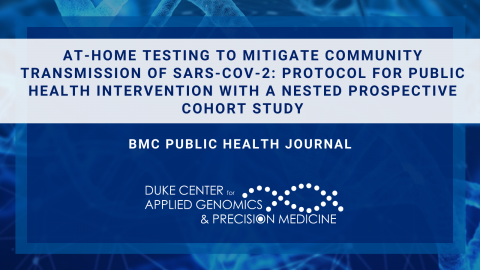
The Duke Center for Applied Genomics & Precision Medicine’s Associate Director, Christopher W. Woods, MD, co-authored a recent publication in the BMC Public Health Journal studying the impact of rapid at-home testing on COVID-19 trends, “At-home testing to mitigate community transmission of SARS-CoV-2: protocol for public health intervention with a nested prospective cohort study.” This non-pharmaceutical intervention remains critical to controlling disease transmission and can ease the burden associated with facility-based testing. At-home testing can additionally improve testing access in high-risk communities. This study evaluates the impact that at-home testing has on both COVID-19 transmissions and socio-behavioral patterns in underserved populations.
A public health intervention titled “Say Yes! COVID Test,” (SYCT) ––which entailed at-home self-testing using SARS-CoV-2 rapid antigen assay––was implemented in various areas around North Carolina and Tennessee. Participants received test kits either via online orders or local community distribution partners. Researchers examined trends in COVID-19 cases and hospitalizations, COVID-19 viral load in wastewater, and population mobility in each community before, during, and after the distribution of at-home tests.
This approach of distributing at-home rapid antigen tests for COVID-19 minimizes risks by leveraging community engagement and maximizes rewards by selectively complementing ecological study data with the participants’ specific information. The inclusion of high-tech and low-tech pathways provided participants with a broader accessibility of both the COVID-19 tests and the research study participation itself.
The findings from the SYCT project will provide insight into methods to mitigate viral transmission, advance the science of public health communications and community engagement, and evaluate new assessments of community transmission of disease.